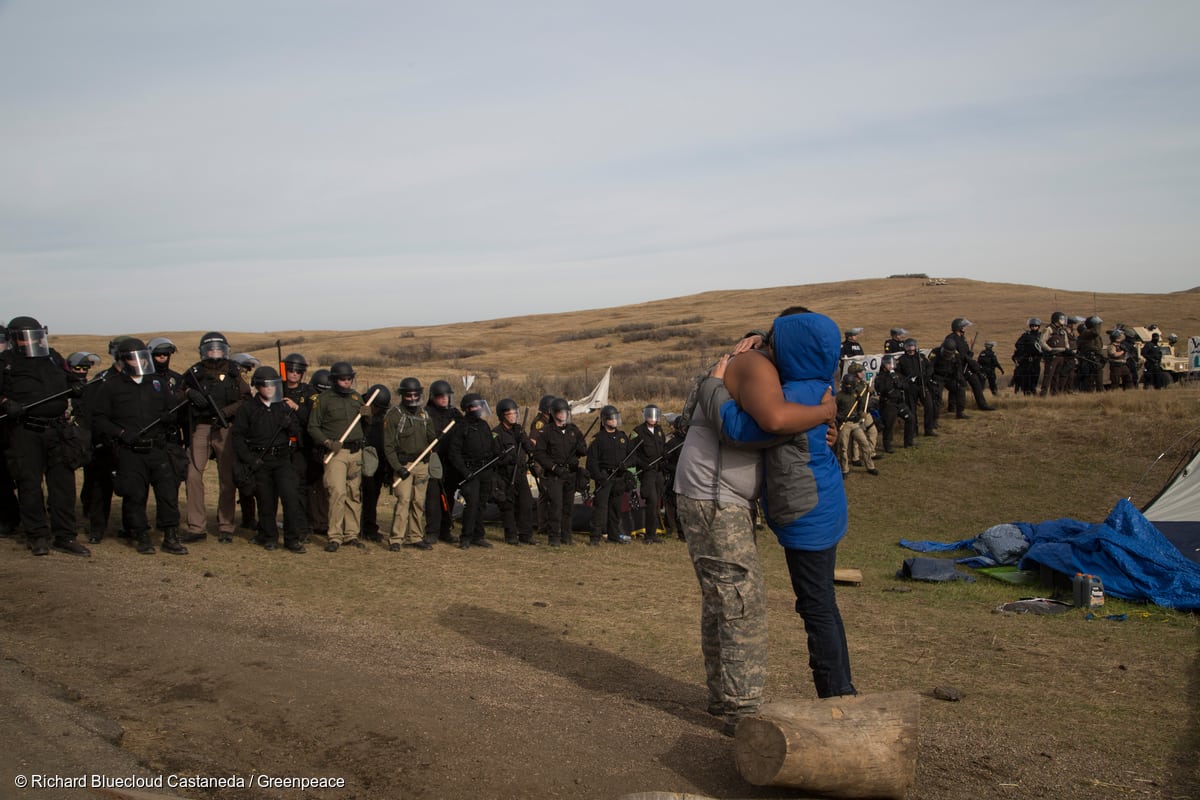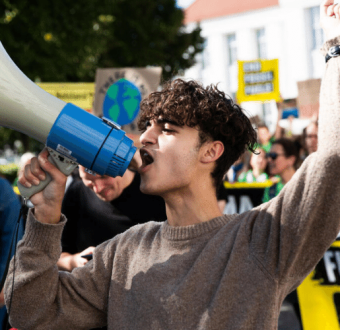Last week, a judge in North Dakota dismissed a case against TigerSwan, the security firm hired by Energy Transfer Partners that intervened during the protests of the Dakota Access Pipeline. The case, which aimed to hold TigerSwan responsible for operating in North Dakota without a license, was brought by the North Dakota Private Investigation and Security Board. The judge dismissed one of three counts last month and the remaining count on Wednesday.
This matters. It matters for the people who have been impacted by TigerSwan’s unlicensed, paramilitary tactics, and for the people fighting pipelines around the country where TigerSwan could be deploying these tactics all over again. It matters because peaceful Indigenous Water Protectors have faced heavy penalties for protecting their land and water while TigerSwan has never been held accountable for their activities.

People join hands for a closing ceremony in support of the Standing Rock Nation in City Center Plaz calling on the U.S. Army Corps of Engineers to cancel the permits for the Dakota Access Pipeline. The protest was one of many in a global day of action against the DAPL.
TigerSwan was one of the starring villains in the story of what happened to protesters who dared to stand up against the Dakota Access Pipeline. Energy Transfer Partners hired TigerSwan to manage their private security as they moved forward on their plans to build the controversial pipeline through Indigenous land, threatening the water and cultural artifacts of the Standing Rock Sioux Tribe. When their license was denied, they claimed to be offering consulting services instead and operated without a license in the months that followed. The response to the peaceful opposition of Indigenous Water Protectors was quick and harsh, and involved local police and TigerSwan. According to leaked documents obtained by The Intercept, TigerSwan provided in-depth security reports to the police through the work of its operatives’ on-the-ground tactics. TigerSwan then used those reports to instigate a larger and more aggressive police presence that unrolled increasingly forceful tactics against protesters, including tear gas, rubber bullets, and water cannons; they additionally infiltrated and spied on activist groups and gathered information for a bogus lawsuit against Greenpeace USA and others. The subsequent violence and dehumanizing treatment of activists escalated quickly and left many individuals physically harmed and emotionally traumatized.
Their claim that they did this remotely is at odds with the on-the-ground intelligence found in the leaked documents obtained by the Intercept. All of their activity was performed without a license while in the employ of a pipeline company with a clear agenda of intimidating and harassing protesters.
In fact, the Special Rapporteur for the UN on the Right to Freedom of Assembly, Maina Kiai, said that “the excessive use of State security apparatus to suppress protest against corporate activities that are alleged to violate human rights is wrong and contrary to the UN Guiding Principles on Business and Human Rights.” This statement was endorsed by six other UN special experts.1
TigerSwan managed other security firms and contractors, including Silverton, Russell Group of Texas, 10 Code LLC, Per Mar, SRC, OnPoint, and Leighton who, along with law enforcement and National Guard routinely used excessive force with protestors. When Democracy Now! captured those attacks on camera, the host of that show, Amy Goodman, was arrested. Police and security used rubber bullets, pepper spray, tear gas, mace, water cannons and attack dogs to deter activists, held protesters and Water Protectors in cages and even dog kennels — paramilitary tactics consistent with their founder’s background in special forces.

Water Protectors engineered a makeshift wooden pedestrian bridge over the Cantapeta Creek. They were trying to access ancestral burial grounds they believe are being damaged by the Dakota Access Pipeline construction. Heavily armed law enforcement officials were deployed. As they pulled the bridge apart with boats, the Water Protectors swam and used their own boats to cross the water. Standing unarmed in the cold water, the protectors were forcibly repelled by law enforcement with tear gas, pepper spray, and rubber bullets.
While this case is about their licensing, ultimately TigerSwan must be held accountable for their role in this continued escalation of tactics. The consequences are too great — both for the individuals that they exert power over, and for our ability to freely speak out against corporations and their toxic projects.
They are currently seeking a license in Louisiana, where Energy Transfer Partners is building the Bayou Bridge pipeline. When they were denied a license there, an employee Lisa Smith registered a new company and applied for a new permit without disclosing her connection to TigerSwan. TigerSwan does have a license in Pennsylvania where they have carried out many of the same tactics, including keeping local residents unaware of a spill of ethane and propane near their home for three weeks in April 2017.
A future where companies like TigerSwan can intimidate and physically and emotionally harm protesters while on the payroll of the company building the project protesters are resisting is frankly terrifying. This new aspect of corporate power could be a disaster for our right to peacefully protest. And more than that, the violence that TigerSwan used against Water Protectors at Standing Rock is a symptom of a larger problem and recalls the more than 500 years of economic, physical and cultural violence and genocide perpetrated against Indigenous people. As Energy Transfer Partners and other pipeline companies regularly ignore Indigenous sovereign rights over their territories, it is in the context of a long history of violence and erasure of Indigenous people. Hiring companies like TigerSwan brings that violence to the front lines of the fight.

No justice, no peace.
As the case is appealed, we’ll be watching closely to see what happens next and hope that justice will be served.
Stand up to Energy Transfer Partners, the company that hired TigerSwan. Sign this petition to ask banks around the world to stop funding Energy Transfer Partners because of their violations of human rights, including egregious violations of Indigenous rights.


